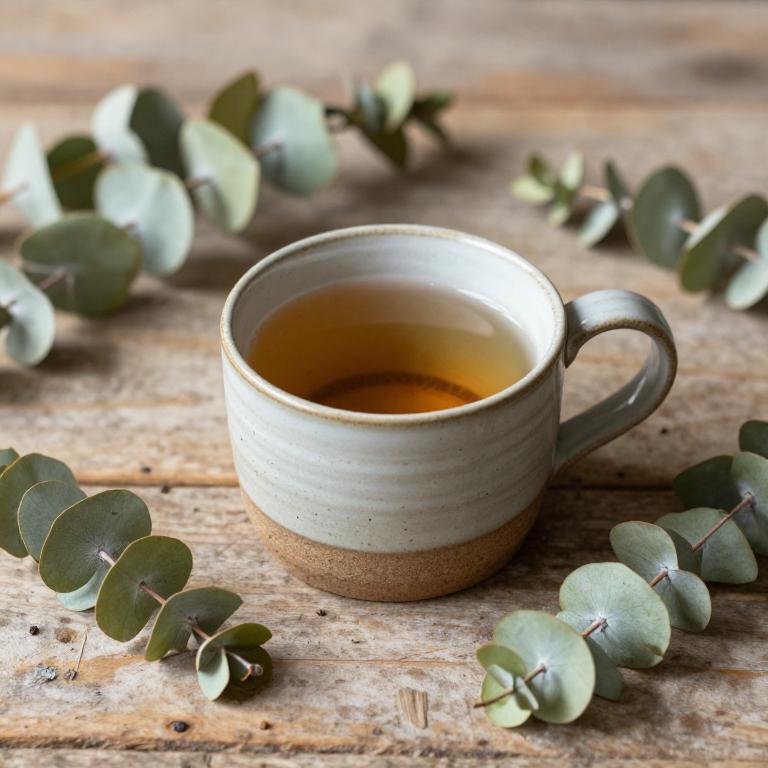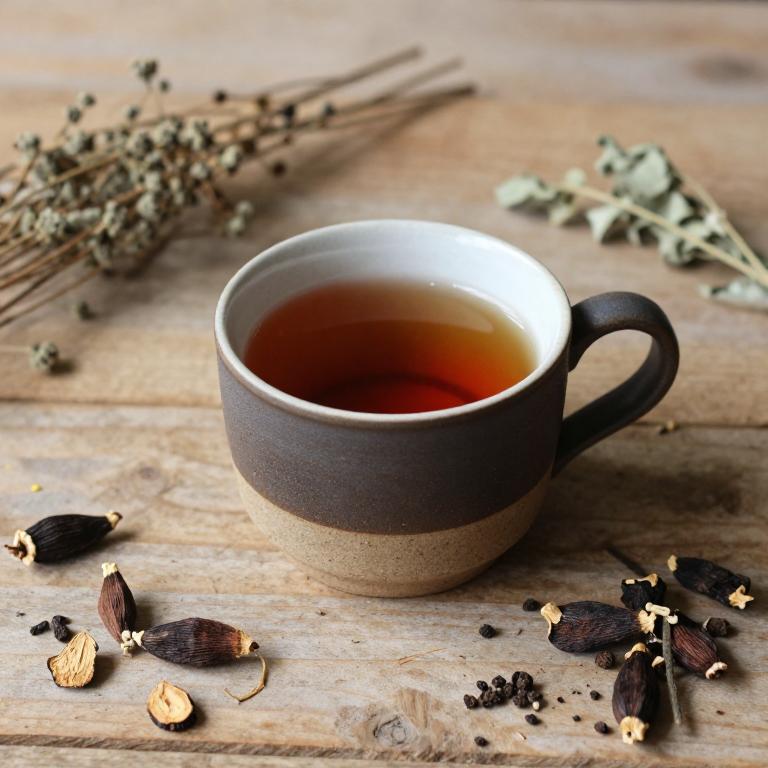10 Best Herbal Teas For Emphysema

Herbal teas may offer some supportive benefits for individuals with emphysema by promoting lung health and reducing inflammation.
Certain herbs such as ginger, turmeric, and licorice root are believed to have anti-inflammatory and antioxidant properties that may help ease breathing and reduce mucus production. While herbal teas are not a cure for emphysema, they can be used as a complementary therapy alongside prescribed treatments. It is important to consult a healthcare provider before incorporating herbal teas into a treatment plan, as some herbs may interact with medications or have side effects.
Overall, herbal teas can be a soothing addition to a holistic approach to managing emphysema symptoms.
Table of Contents
- 1. Thyme (Thymus vulgaris)
- 2. Salvia (Salvia officinalis)
- 3. Eucalyptus (Eucalyptus globulus)
- 4. Stinging nettle (Urtica dioica)
- 5. Black pepper (Piper nigrum)
- 6. Cumin (Cuminum cyminum)
- 7. Camellia (Camellia sinensis)
- 8. Ginger (Zingiber officinale)
- 9. Rosemary (Rosmarinus officinalis)
- 10. Peppermint (Mentha piperita)
1. Thyme (Thymus vulgaris)

Thymus vulgaris, commonly known as thyme, is a herb often used in herbal teas for its potential respiratory benefits.
While there is no strong scientific evidence that thyme tea can cure emphysema, some traditional remedies suggest it may help alleviate symptoms such as coughing and congestion due to its expectorant properties. Thyme contains compounds like thymol, which have antimicrobial and anti-inflammatory effects that may support overall respiratory health. However, it is important to note that thyme should not replace conventional medical treatments for emphysema, and individuals should consult with a healthcare provider before using it as a complementary therapy.
Overall, while thyme herbal tea may offer some supportive benefits, it is not a proven treatment for this chronic lung condition.
2. Salvia (Salvia officinalis)

Salvia officinalis, commonly known as sage, has been traditionally used in herbal teas for its potential respiratory benefits.
While scientific evidence specifically linking sage tea to the treatment of emphysema is limited, some studies suggest that its anti-inflammatory and antioxidant properties may support lung health. Sage contains compounds like rosmarinic acid and flavonoids, which could help reduce inflammation in the airways and improve respiratory function. However, it is important to note that sage tea should not replace conventional medical treatments for emphysema and should be used as a complementary therapy under the guidance of a healthcare professional.
Overall, while sage tea may offer some supportive benefits, further research is needed to confirm its efficacy in managing emphysema symptoms.
3. Eucalyptus (Eucalyptus globulus)

Eucalyptus globulus, commonly known as the Australian tea tree, is often used in herbal teas for its potential respiratory benefits.
These teas may help ease symptoms of emphysema by promoting bronchodilation and reducing mucus buildup in the airways. The essential oils in eucalyptus globulus contain compounds like cineole and limonene, which have anti-inflammatory and decongestant properties. While not a cure for emphysema, eucalyptus herbal tea can serve as a complementary therapy to support overall respiratory health.
However, it is important to consult a healthcare professional before using it, especially for individuals with chronic lung conditions.
4. Stinging nettle (Urtica dioica)

Urtica dioica, commonly known as stinging nettle, has been traditionally used in herbal medicine for its potential respiratory benefits.
Some studies suggest that stinging nettle tea may help reduce inflammation and mucus production, which could be beneficial for individuals with emphysema. However, it is important to note that there is limited scientific evidence specifically supporting its use for this condition. While some people may find relief from symptoms through regular consumption of stinging nettle tea, it should not replace prescribed medical treatments for emphysema.
Always consult with a healthcare professional before incorporating any herbal remedy into a treatment plan.
5. Black pepper (Piper nigrum)

Piper nigrum, commonly known as black pepper, is often used in herbal teas for its potential health benefits, though it is not a primary treatment for emphysema.
While black pepper contains compounds like piperine that may support respiratory health and reduce inflammation, there is limited scientific evidence specifically linking it to the management of emphysema symptoms. Some people may use black pepper tea as a complementary remedy to help ease breathing and reduce mucus production, but it should not replace prescribed medical treatments. It is important to consult a healthcare provider before using any herbal remedy, especially for a condition like emphysema, which requires comprehensive management.
Overall, while black pepper tea may offer some supportive benefits, it should be used cautiously and in conjunction with conventional medical care.
6. Cumin (Cuminum cyminum)

Cuminum cyminum, commonly known as cumin, is a herb that has been traditionally used in herbal teas for its potential respiratory benefits.
While there is limited scientific evidence specifically linking cumin tea to the treatment of emphysema, some studies suggest that its anti-inflammatory and antioxidant properties may support lung health. Cumin tea is often consumed to help alleviate symptoms such as congestion and coughing, which are common in individuals with chronic obstructive pulmonary disease (COPD), including emphysema. However, it is important to note that cumin tea should not replace prescribed medical treatments for emphysema and should be used as a complementary therapy under the guidance of a healthcare professional.
Overall, while cumin may offer some supportive benefits, it is not a cure for emphysema and should be part of a comprehensive treatment plan.
7. Camellia (Camellia sinensis)

Camellia sinensis, the plant from which green and black teas are derived, contains bioactive compounds such as polyphenols and catechins that may support respiratory health.
While there is no direct evidence that Camellia sinensis herbal teas can cure emphysema, some studies suggest that the antioxidants in these teas may help reduce inflammation and oxidative stress, which are contributing factors in lung diseases. Herbal teas made from Camellia sinensis are often consumed for their calming effects and potential respiratory benefits, though they should not replace prescribed medical treatments. It is important for individuals with emphysema to consult with healthcare professionals before incorporating any herbal teas into their regimen.
Overall, Camellia sinensis herbal teas may offer supportive benefits but are not a substitute for conventional medical care in managing emphysema.
8. Ginger (Zingiber officinale)

Zingiber officinale, commonly known as ginger, has been traditionally used in herbal teas to support respiratory health, including for individuals with emphysema.
The active compounds in ginger, such as gingerol and shogaol, possess anti-inflammatory and antioxidant properties that may help reduce lung inflammation and improve respiratory function. Drinking ginger tea can aid in easing bronchial congestion and may help alleviate symptoms like coughing and shortness of breath. While it is not a cure for emphysema, ginger tea can be a complementary therapy when used alongside conventional medical treatments.
However, it is important to consult with a healthcare provider before incorporating ginger into a treatment regimen, especially for those with existing health conditions or taking medications.
9. Rosemary (Rosmarinus officinalis)

Rosmarinus officinalis, commonly known as rosemary, is a herb often used in herbal teas to support respiratory health, including in individuals with emphysema.
The essential oils in rosemary, such as cineole and camphor, possess anti-inflammatory and bronchodilatory properties that may help reduce airway inflammation and improve breathing. While not a cure for emphysema, rosemary tea may offer symptomatic relief by easing mucus congestion and promoting clearer airways. It is often recommended as a complementary therapy alongside conventional treatments, but it should not replace medical advice or prescribed medications.
As with any herbal remedy, it is important to consult a healthcare provider before incorporating rosemary tea into a treatment regimen for emphysema.
10. Peppermint (Mentha piperita)

Mentha piperita, commonly known as peppermint, has been traditionally used in herbal teas to support respiratory health, including in conditions like emphysema.
The essential oils in peppermint, particularly menthol, may help to relax the bronchial muscles and ease breathing by reducing airway inflammation and mucus production. While not a cure for emphysema, peppermint tea can act as a natural remedy to alleviate some of the symptoms associated with the condition. It is often recommended to consume peppermint tea in moderation, as excessive intake may cause gastrointestinal discomfort or interact with certain medications.
As with any herbal treatment, it is advisable to consult a healthcare professional before incorporating peppermint tea into a management plan for emphysema.